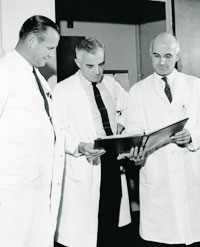<Back to Index>
- Urologist John Hartwell Harrison, 1909
PAGE SPONSOR

John Hartwell Harrison (February 16, 1909 – January 20, 1984) was a key member of the pioneer medical team that received the 1961 Amory Prize of the American Academy of Arts and Sciences for bringing kidney transplantation to the world.
Dr. Harrison was born in Clarksville, Virginia, the son of Rosalie S. and I. Carrington Harrison, M.D.; he was reared in Danville, Virginia, and graduated at the University of Virginia with a bachelor of science degree in 1929, and an M.D. in 1932. After an internship in internal medicine at Lakeside Hospital, Cleveland, he pursued postgraduate training in surgery at the Peter Bent Brigham (now Brigham and Women's) Hospital in Boston. He joined the Brigham staff in 1939, was made head of its Division of Urology in 1941, and made Brookline, MA, his permanent home with his wife and four children. During World War II, he served in the Army Medical Corps in the Pacific Theater of Operations.
Dr. Harrison, Joseph E. Murray, John P. Merrill and others achieved the first successful kidney transplant, between identical twins Richard and Ronald Herrick, in December 1954 at the Brigham Hospital. Dr. Harrison's primary role was to remove the donor's kidney in this premier transplant collaboration. Dr. Murray received the 1990 Nobel Prize in Medicine for this and later work.
The surgery which Dr. Harrison performed on the donor was historic in that it was the first time a patient was subjected to an operation which was not for his own benefit. The decision to proceed was made after consultation with clergy and others who carefully scrutinized the ethical aspects. An extraordinary burden was inherently imposed upon Dr. Harrison in the care of his healthy patient, whereas the surgeon for the recipient was operating on a patient otherwise doomed to die, and the nephrologist had no ability to cure this terminally ill patient.
Dr. Murray related the following exchange between Dr. Harrison and his patient: "At the conclusion of our last pre-operative discussion, the donor asked whether the hospital would be responsible for his health care for the rest of his life if he decided to donate his kidney. Dr. Harrison said, 'Of course not.' But he immediately followed with the question, 'Ronald, do you think anyone in this room would ever refuse to take care of you if you needed help?' Ronald paused, and then understood that his future depended upon our sense of professional responsibility rather than on legal assurances."
In 1971, Dr. Harrison received the Purkinje Medal from Czechoslovakia. In May 1983, he was awarded the Keyes Medal from the American Association of Genito - Urinary Surgeons, arguably the highest American honor in the field of urology.
He served as Elliott Cutler Professor of Surgery at Harvard Medical School and held honorary degrees from Harvard and from Roger Williams College. He was named the 1976 Honorary Fellow of the Royal College of Surgeons in Ireland, and made a member of the Irish Urological Society and the British Association of Urological Surgeons. He authored over 140 articles and monographs on urologic and general surgery, and other medical issues, and was Editor of the three volume reference text, Campbell's Urology (4th ed., 1978).
He served as President of the Boston Surgical Society, Vice President
of the American Surgical Association, and for eight years was a member of the
Board of Visitors of the University of Virginia. Dr. Harrison was also a
urologic consultant to the Air Force and the Veterans Administration.